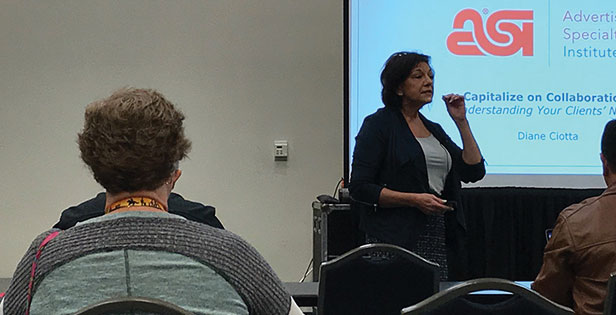February 04, 2019
Focus on Client Needs, Not Products
When working with clients, the first order of business, according to Diane Ciotta of Training Classics, is for sales reps to take themselves out of the equation.
“It’s not about you,” she told the attendees gathered for “Capitalize on Collaboration: Understanding Your Clients’ Needs,” her ASI Fort Worth education session. “The client’s need is most important. You have to communicate about it.”

Speaker Diane Ciotta during an ASI Education session
It’s the first step in the sales process, said Ciotta. Don’t try to close the sale at the outset by focusing on just one product or making assumptions. Instead, take the time to open the process. It builds a stronger relationship, and positions sales reps as consultants rather than order-takers.
By determining customer objectives, reps can figure out the best recommendations for their clients and enhance the presentation with benefit statements that resonate with them.
“If a statement about the product can be answered with ‘so what?’ then it’s not a benefit statement,” said Ciotta. “A benefit ties back to them and makes a difference to them.”
Wise sales professionals ask open-ended questions versus close-ended ones; more actionable information is gleaned from questions requiring detail to respond, rather than those that can be answered with a simple yes or no, Ciotta added.
“Don’t assume you know what their needs are, even if you’ve worked in their industry before,” said Ciotta. “Open-ended questions give them more opportunity to participate in the process.”
She also reminded the audience not to get hung up on selling a specific product, which centers the conversation too much on what the rep wants to sell; instead, the focus should be on selling them an item that meets their needs.
Ciotta used the example of a homeowner who goes to the hardware store to buy a drill bit. If the sales rep at the store simply points the customer to the drill bits without providing further information, the customer will most likely buy on price. Then, when the bit doesn’t work for their needs, they’re unhappy with the rep and the store. In the promotional products industry too, customers often make their decisions based on price, and then aren’t satisfied with the experience. True sales consultants avoid that situation.
“A sales professional at the store will ask, ‘What are you trying to do? What material are you drilling into?’ and so on,” said Ciotta. “They’ll find out about their needs first. Everything they ask has nothing to do with the product, only with the end result.”
The clues the rep gleans from the responses help them come up with recommendations, and allows them to quickly eliminate those items that aren’t viable for a particular client.
“This isn’t a game of darts,” said Ciotta. “Don’t try to guess at their needs. Take away the things that won’t work for them. Salespeople will try to make a square peg fit into a round hole, while consultants want it to fit like a puzzle piece.”
When the customer does find a product that meets their needs, what happens when they look at the price and it’s more than they had expected to spend? Ciotta said they’ll either say no to the product or, what’s more likely, they’ll proceed confidently to the close, knowing they have what will work for them.
An additional piece of the puzzle is what Ciotta called the client’s “comfortable investment range.” Here, reps should ask customer directly what their budget is, and then put together a list of recommendations based on that number.
“Reps will say they don’t want to make anyone uncomfortable by asking about budget,” said Ciotta, “but don’t beat around the bush. Ask them what they’re comfortable investing for the specific result they want and keep it open-ended. They should invest in something that has a benefit. To get all the things they say are important to them, they’re going to be spending a different amount.”